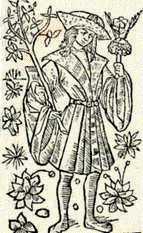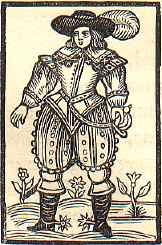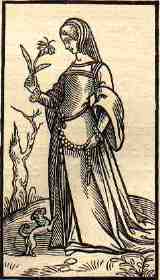The Sonnets: the cast of characters
The Sonnets have no real plot, but there are a number of characters involved.
The Poet | |
|
The poet, the "I" of the poem, is older than the Young
Man, in some poems older than Shakespeare
would literally have been. He loves the Young Man, but
there is a quarrel (see sonnets 33-35) and at times the
Poet despairs* of the Young Man's
love. The poet is both attracted and repelled by the Dark
Woman. Many of the sonnets become meditations on the destruction of beauty and the passage of time*. | |
The Young Man | |
|
From The Roxburghe Ballads. University of Victoria Library. |
The first 126 sonnets are written to a Young Man; the
first group (about 20) urge him to marry, while the later
ones deal more generally with beauty, love, time and so
on. The Young Man is a beloved friend, possesses great
beauty*, and should
preserve that beauty by having
children*. Later, the Young Man has an affair* with the Dark Woman; there are sonnets describing a quarrel, the Poet's feelings during absence, and the Young Man's often irresponsible behaviour. Just who the Young Man was, and what was Shakespeare's personal relationship to him has been the subject of much speculation. Shakespeare was certainly starting from a well-established Renaissance tradition of male friendship. There is no concrete evidence to establish whether the relationship was sexual; although at least one sonnet seems explicitly* to suggest that it could not be so, like many of the sonnets it is charged with strong feelings, both positive and negative. |
The Dark Woman | |
|
The Dark Woman, despite her darkness of hair and
feature*, is sexually attractive; the Poet
is duly attracted--and repelled*. | |
A Rival Poet
A Rival Poet, with "proud full sail" of his "great verse" competes for the attention of the Young Man (see numbers 79-86). Various candidates have been suggested, including Marlowe, Chapman, Lyly, and Markham.
Footnotes
-
Doubt of the Young Man's integrity
Lilies that fester smell far worse than weeds
(Sonnet 94; see also numbers 67, 69, 89-96.) -
On the passage of time and the destruction of beauty
Since brass, nor stone, nor earth, nor boundless sea,
But sad mortality o'ersways their power,
How with this rage shall beauty hold a plea,
Whose action is no stronger than a flower?
(Sonnet 65; see also numbers 5, 7,11,12, 15, 18, 19, 60, 63-65, 73, 100, 115, 116, 123, 126.)
See also the following page. -
The Young Man's beauty
Shall I compare thee to a summer's day?
Thou art more lovely and more temperate. . .
(Sonnet no. 18) -
An argument for having children
...Dear my love, you know,
You had a father; let your son say so.
(Sonnet 13) -
An affair between the Young Man and the Dark Woman?
Two loves I have, of comfort and despair,
Which like two spirits do suggest me still;
The better angel is a man right fair,
The worser spirit a woman coloured ill.
(Sonnet 144; see also 40-42.) -
Sexual ambiguity?
In a poem of deep sexual ambiguity (and some misogyny), the Poet uses a bawdy pun to suggest that the Young Man's maleness makes it impossible for his love to be consummated, despite the Young Man's otherwise feminine attractiveness:
A woman's face, with Nature's own hand painted,
Hast thou, the master mistress of my passion;
A woman's gentle heart, but not acquainted
With shifting change, as is false women's fashion;
* * * * *
And for a woman wert thou first created,
Till Nature as she wrought thee fell a-doting,
And by addition me of thee defeated,
By adding one thing to my purpose nothing.
But since she pricked thee out for women's pleasure,
Mine be thy love, and thy love's use their pleasure.
(Sonnet 20) -
Dark woman, dark beauty.
Listen to the sonnet that delightfully parodies Petrarchan beauty:
My mistress' eyes are nothing like the sun;
Coral is far more red than her lips' red;
If snow be white, why then her breasts are dun;
If hairs be wires, black wires grow on her head;
I have seen roses, damasked, red and white,
But no such roses see I in her cheeks,
And in some perfumes is there more delight
Than in the breath that from my mistress reeks.
I love to hear her speak, yet well I know
That music hath a far more pleasing sound.
I grant I never saw a goddess go;
My mistress when she walks treads on the ground.
And yet, by heaven, I think my love as rare
As any she belied by false compare.
(Sonnet 130) -
Dark soul?
The Dark Woman is seen as being black in her personality as well as beauty:
For I have sworn thee fair, and thought thee bright,
Who art as black as hell, as dark as night.
(Sonnet 147)


